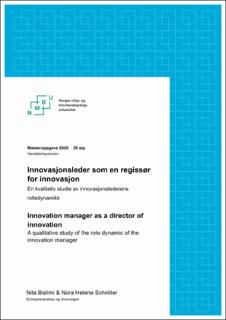| dc.contributor.advisor | Killingberg, Nils Magne | |
| dc.contributor.advisor | Kubberød, Elin | |
| dc.contributor.author | Bislimi, Nita | |
| dc.contributor.author | Schnitler, Nora Helene | |
| dc.coverage.spatial | Norway | en_US |
| dc.date.accessioned | 2020-09-23T13:13:12Z | |
| dc.date.available | 2020-09-23T13:13:12Z | |
| dc.date.issued | 2020 | |
| dc.identifier.uri | https://hdl.handle.net/11250/2679325 | |
| dc.description.abstract | Formålet med denne studien har vært å belyse hvordan individer med Entreprenørskap og Innovasjonsutdanning fra NMBU utøver deres rolle i etablerte organisasjoner. Entreprenørskap og innovasjons-studiet legger opp utdanningsløpet veldig praksisnært med kompetanse innenfor gründervirksomhet. Til tross for dette, er det et fåtall av de uteksaminerte som faktisk blir gründere. Det er med andre ord flere med en slik master som jobber i etablerte organisasjoner. For å forstå innovasjonslederens rolle i en etablert organisasjon har vi brukt Levinson (1959) sin rolleteori som omhandler tre aspekter av en rolle; Eksterne rollekrav som settes av organisasjonen, subjektiv rolleforståelse og faktisk rolleutøvelse. I lys av Levinson sin rolleteori, har vi brukt innovasjon og entreprenørskapsteori for å belyse hvordan rollen til individer med entreprenørskap og innovasjons kompetanse utøves i organisasjoner. Med bakgrunn i dette, har studien forsøkt å besvare følgende problemstilling:
Hvordan utøver individer med en mastergrad i entreprenørskap og innovasjon sin rolle som innovasjonsledere i en etablert organisasjon?
I forbindelse med studien, har vi gjennomført 10 dybdeintervjuer med innovasjonsledere i etablerte organisasjoner. Funnene viser at innovasjonslederrollen er dynamisk med en kontinuerlig utvikling. Innovasjonslederen har blitt identifisert som en utfordrer og en som får ting i bevegelse og blir gjerne satt til å planlegge, forhandle, selge, koordinere og lede. I motsetning til en typisk gründer som må gjøre de fleste oppgaver selv, regisserer innovasjonslederen innovasjon gjennom andre. Med andre ord, arbeidsoppgaver som minner om prosjektlederrolle. Vi ser at egenskaper som særlig det å lære og hente inn ny kunnskap er viktig for rollen deres. Innovasjonslederen blir med andre ord aldri ferdig utlært. Vårt studiet har identifisert to handlingsprinsipper for innovasjonsledere.
Fulltids innovasjonslederne som har en mer utforskende tilnærming til innovasjon, hvor kontinuerlig kontakt med kunden er viktig for å forstå behov og dermed tilby løsning.
Deltids innovasjonslederne som har en mer utnyttende tilnærming til innovasjon. De belager seg mer på organisasjonens interne ressurser og ekspertise, og dermed krever mindre kontakt med kunden. Det kan dermed tyde på at innovasjonslederens gitte ressurser fra organisasjonen påvirker handlingsprinsippene. Avslutningsvis var det et viktig funn at det er mye uenighet omkring hva innovasjon faktisk betyr. Dette byr på utfordringer og gjør at innovasjonslederrollen til tider kan bli vanskelig og litt upopulær. | en_US |
| dc.description.abstract | The purpose of this study has been to help understand how individuals with a major in Entrepreneurship and Innovation from Norwegian University of Life Sciences perform their role in established organizations. Entrepreneurship and Innovation program sets up the course very similar to practices in startups. Despite this, there is only a few of the graduates that actually start their own company and becomes entrepreneurs. In other words, the majority of Entrepreneurship and Innovation graduates, work with innovation in established organizations. In order to understand the innovation management role, we have examined entrepreneurship and innovation theory by using Levinson´s (1959) role theory as a framework. This framework explains an individual’s role performance as a result of external requirements and individual’s internal forces. In respect to this, we have developed the following thesis statement:
How do individuals with a major in Entrepreneurship and Innovation perform their role
as Innovation Managers in established organizations?
Through this study we have completed 10 individual in- depth interviews of innovation managers working in established organizations. Our founding’s suggest the innovation manager role as dynamic with an ongoing development. The innovation manager has been identified as a challenger that usually end up working with planning, negotiation, selling, coordinating and leading. Unlike entrepreneurs, who do most of the task themselves, the innovation manager innovate by coordinating tasks across people and use the organizations resources to do so. In other words, role that resembles a typical project manager. We have observed that typical traits such as learning is important for the innovation manager. Our findings also suggest that the innovation manager acts and behaves differently with innovation. Throughout our study, we had identified two types innovation managers.
Full time innovation manager that have an explorative approach to innovation, where contact with customer is essential to understand their needs and therefore solution.
Part time innovation mangers that have a more exploitative approach to innovation. These type of innovation managers usually rely on the organizations internal resources and expertise in order to solve customer problems and therefore also requires less contact with customers. There can be seen a connection between the innovation manager’s available resources and the actions they take towards innovation. Lastly, our study suggests there is a great deal of disagreement within the organization when it comes to what innovation means. This in turn, challenges the innovation manager by making his role at times difficult and a centre of discussion. | en_US |
| dc.language.iso | nob | en_US |
| dc.publisher | Norwegian University of Life Sciences, Ås | en_US |
| dc.rights | Attribution-NonCommercial-NoDerivatives 4.0 Internasjonal | * |
| dc.rights.uri | http://creativecommons.org/licenses/by-nc-nd/4.0/deed.no | * |
| dc.subject | Innovasjonsledelse | en_US |
| dc.subject | Innovation management | en_US |
| dc.subject | Entrepreneurship | en_US |
| dc.subject | Entreprenørskap | en_US |
| dc.title | Innovasjonsleder som en regissør for innovasjon : en kvalitativ studie av innovasjonslederens rolledynamikk | en_US |
| dc.title.alternative | Innovation manager as a director of innovation : a qualitative study of the role dynamic of the innovation manager | en_US |
| dc.type | Master thesis | en_US |
| dc.subject.nsi | VDP::Samfunnsvitenskap: 200 | en_US |
| dc.source.pagenumber | 108 | en_US |
| dc.description.localcode | M-EI | en_US |

